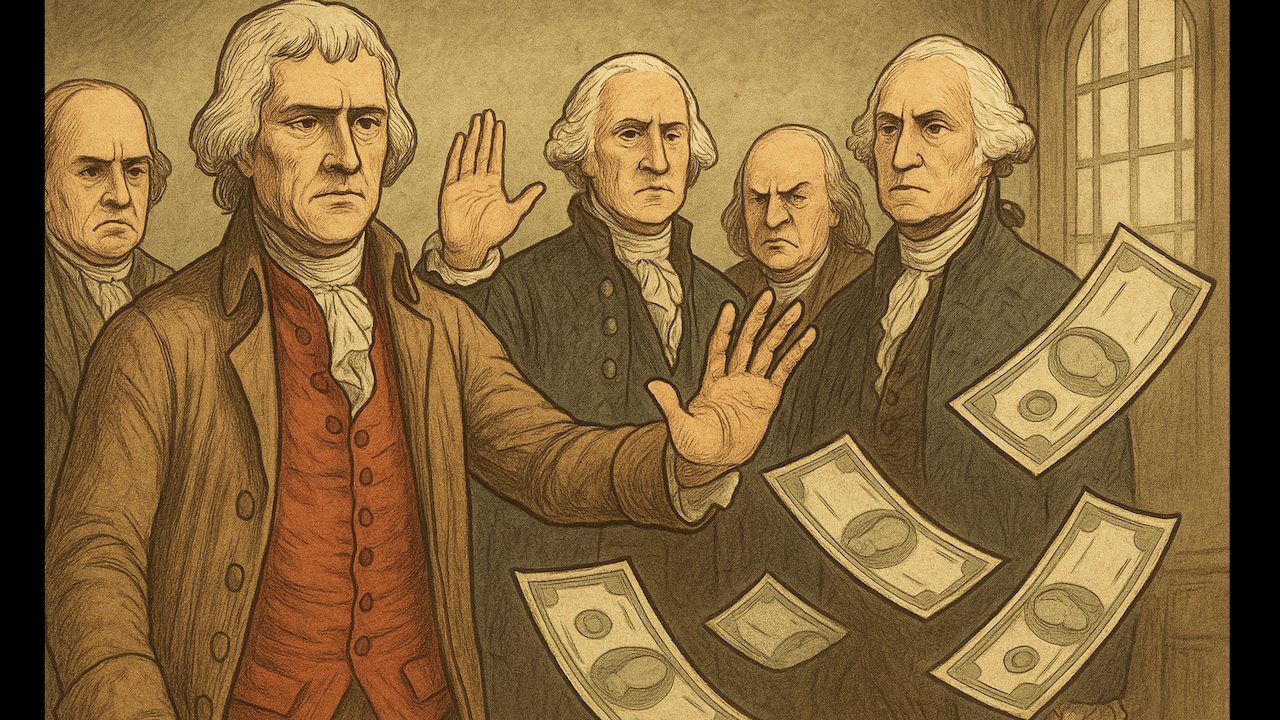(Mike Maharrey, Money Metals News Service) As we celebrate America’s independence, there is a lot of focus on the Founding Fathers. After all, they drove the American Revolution.
The revolution was a mind-boggling accomplishment. It was incredible that rag-tag U.S. forces were able to face down the mighty British Empire. But I would argue the philosophical evolution in the hearts and minds of the founding generation was the real revolution, and it was even more unlikely than the military victory.
After the war, John Adams argued that a “radical change in the principles, opinions, sentiments and affections,” along with a “change in their Religious Sentiments, of their Duties and Obligations” made up the “real American Revolution.”
Most significantly, the Americans came to believe that the people are sovereign and above the government, the government exists to serve them, and that government power is rightfully limited by the will of the people.
It’s hard to conceptualize just how radical these ideas were in their time. The revolution sprang up during a time when most people still believed that kings had absolute authority and governments could do as they pleased.
Of course, the founders were far from perfect, but we can’t deny their wisdom given their grasp of political philosophy and the nature of power, and the safeguards they attempted to create in order to protect individual liberty.
With this in mind, I thought it would be a good idea to highlight how some key founding era figures viewed money.
In a nutshell, the founding generation was deeply skeptical of paper money.
That’s because they understood history. They knew that governments and bankers tend to abuse paper money, rapidly depreciating its value. In fact, they lived through it during the war. Paper money almost doomed American independence. And sound money helped save it during the war.
Here are just a few quotes about money from key founding fathers. (Bold emphasis added.)
“The evils of paper money have no end” – Thomas Paine
“Paper is poverty, that it is only the ghost of money, and not money itself.” – Thomas Jefferson
“THE only proper use for paper, in the room of money, is to write promissory notes and obligations of payment in specie upon. A piece of paper, thus written and signed, is worth the sum it is given for, if the person who gives it is able to pay it; because in this case, the law will oblige him. But if he is worth nothing, the paper-note is worth nothing. The value, therefore, of such a note, is not in the note itself, for that is but paper and promise, but in the man who is obliged to redeem it with gold or silver.” – Thomas Paine
“The evils of this deluge of paper money are not to be removed until our citizens are generally and radically instructed in their cause & consequences” – Thomas Jefferson
“It has been long & often observed, that when the current Money of a Country is augmented beyond the Occasions for Money, as a Medium of Commerce, its Value as Money diminishes, its Interest is reduced, and the Principal sinks if some Means are not found to take off the surplus Quantity.” – Benjamin Franklin
“Every Body sees that the Depreciation of the Paper Currency is owing to the Floods of it which have been necessarily issued.” – Samual Adams
“Paper money has had the effect in your State that it ever will have, to ruin commerce – oppress the honest, and open a door to every species of fraud and injustice.” – George Washington
“Provisions, and all kinds of goods rise in proportion to the depreciation of the paper money.” – Thomas Jefferson
“The Resources of the Country may be drawn forth by our Paper at the same Time it must be confessed that this Paper will thereby be less valuable. After all the Debt does not increase for a certain Sterling Sum which would have paid it one Year ago will pay it now. The Depreciation in the Interim hath operated as a Tax.” – Gouverneur Morris
“The flood of paper money, as you well know, had produced an exaggeration of nominal prices and at the same time a facility of obtaining money, which not only encouraged speculations on fictitious capital, but seduced those of real capital, even in private life, to contract debts too freely.” – Thomas Jefferson
“ONE of the evils of paper-money is, that it turns the whole country into stock-jobbers. The precariousness of its value and the uncertainty of its fate continually operate, night and day, to produce this destructive effect. Having no real value in itself it depends for support upon accident, caprice and party, and as it is the interest of some to depreciate and of others to raise its value, there is a continual invention going on that destroys the morals of the country.” – Thomas Paine
“The general Effect of the Depreciation among the Inhabitants of the States, has been this, that it has operated as a gradual Tax upon them. Their Business has been done and paid for by the Paper Money, and every Man has paid his Share of this Tax according to the Time he retain’d any of the Money in his Hands, and to the Depreciation within that Time. Thus it has proved a Tax on Money” – Benjamin Franklin
“Money is Money, and Paper is Paper. – All the invention of man cannot make them otherwise.” – Thomas Paine
Mike Maharrey is a journalist and market analyst for Money Metals with over a decade of experience in precious metals. He holds a BS in accounting from the University of Kentucky and a BA in journalism from the University of South Florida.

